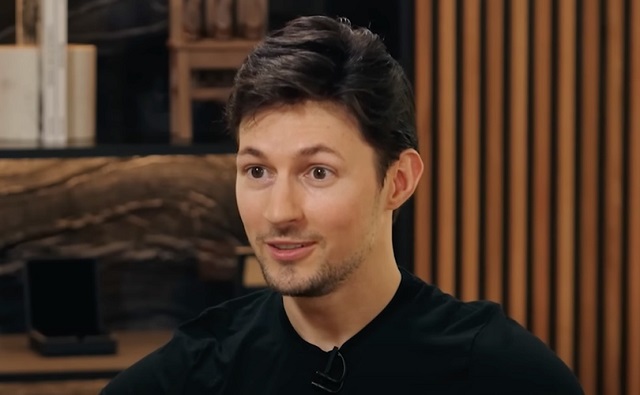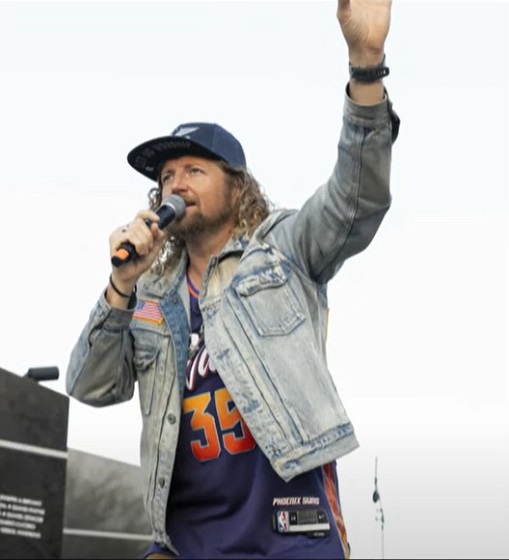International
Telegram founder Pavel Durov criticizes French authorities in first statement after his arrest

From LifeSiteNews
The Telegram CEO implied that French authorities had not tried to reach out to him before his arrest and stressed that if a government was dissatisfied with how an internet service operates, it should start legal action against the company instead of arresting its owner.
Telegram co-founder and CEO Pavel Durov criticized French authorities for his surprising arrest in Paris.
In his first public statement after being released from jail on bail, Durov said that he was questioned by French police for four days and he “was told I may be personally responsible for other people’s illegal use of Telegram, because the French authorities didn’t receive responses from Telegram.”
The Telegram founder said that his arrest was “surprising for several reasons” because Telegram employs a representative that replies to legal requests from the EU and French authorities “had numerous ways to reach me to request assistance,” implying that they had not tried to reach out to him before his arrest.
Moreover, he stressed that if a government was dissatisfied with how an internet service like Telegram operates in its country, it should start legal action against the company instead of arresting its owner.
“Using laws from the pre-smartphone era to charge a CEO with crimes committed by third parties on the platform he manages is a simplistic approach,” Durov wrote. “Building technology is hard enough as it is. No innovator will ever build new tools if they know they can be personally held responsible for potential abuse of those tools.”
The Telegram CEO said that “the right balance between privacy and security is not easy” and revealed that Telegram had often been at odds with governments and that if they were not able to find this balance between security and privacy, “we are ready to leave that country.”
“We’ve done it many times,” he recalled. “When Russia demanded we hand over ‘encryption keys’ to enable surveillance, we refused — and Telegram got banned in Russia.”
“When Iran demanded we block channels of peaceful protesters, we refused — and Telegram got banned in Iran.”
“We are prepared to leave markets that aren’t compatible with our principles, because we are not doing this for money. We are driven by the intention to bring good and defend the basic rights of people, particularly in places where these rights are violated.”
Durov said that Telegram is “not some sort of anarchic paradise” like some media outlets claim, rather it does regularly take down channels and post that are “harmful.”
“However, we hear voices saying that it’s not enough,” he said regarding censorship on the platform. “Telegram’s abrupt increase in user count to 950M caused growing pains that made it easier for criminals to abuse our platform. That’s why I made it my personal goal to ensure we significantly improve things in this regard.”
Durov was arrested on August 24 after his private jet landed at Le Bourget airport just outside of Paris. The billionaire entrepreneur had been under an arrest warrant as part of a police investigation in France into alleged lack of moderation and “criminal activity” on Telegram.
French President Emmanuel Macron denied the charges of Durov’s arrest being politically motivated. However, many have called that into question.
READ: Does anyone believe Emmanuel Macron’s claim that Pavel Durov’s arrest was not political?
While most large social media companies, specifically Meta (Facebook, Instagram), Google (YouTube) and Twitter before Elon Musk’s takeover, censored true information regarding COVID-19, vaccines, LGBT, and other issues in the past years, Telegram remained a mostly censorship-free area for dissidents all over the world.
Health
NEW STUDY: Infant Vaccine “Intensity” Strongly Predicts Autism Rates Worldwide

Across countries on three continents, a 1% increase in vaccine types before age one corresponded to a 0.47% increase in autism prevalence.
A new cross-national study from Italy’s National Research Council, spanning multiple developed countries across three continents, has identified a remarkably strong association between early-life vaccine intensity and autism prevalence. The number of vaccine types and doses administered before 12 months showed exceptionally high correlations with national autism rates.
A 1% increase in vaccine types before age one corresponded to a 0.47% increase in autism prevalence.
The correlation is enormous — r = 0.87 for vaccine types and r = 0.79 for vaccine doses. In regression models, vaccine intensity alone explained 81% of the variance in autism prevalence across nations.
This is not an isolated signal. It directly corroborates earlier U.S. state-level data from DeLong (2011) — and aligns with the 107 positive-association studies catalogued in the McCullough Foundation’s Landmark Autism Report.
Key Findings
Coccia used cross-national 2021 autism incidence data paired with WHO-reported infant vaccine schedules. Countries were grouped into relatively comparable healthcare and surveillance systems (North America, Europe, and advanced Asian nations) to reduce detection and reporting bias. The primary exposures were:
- number of vaccine types given ≤12 months, and
- total number of doses delivered ≤12 months.
Autism prevalence per 100,000 children served as the outcome, and general vaccination coverage rates were statistically controlled so only vaccine intensity and timing were isolated.
The results were striking but unfortunately expected:
- Countries such as the U.S., Canada, Australia, Japan, South Korea, and Singapore give ~15 vaccine types and 20 doses before age one — and have the highest autism prevalence (~1,273 per 100k).
- Countries like Norway, Finland, Denmark, Italy, and the UK give ~8 vaccine types and 9 doses — and have significantly lower autism rates (~834 per 100k).
- A 1% increase in vaccine types before age one corresponded to a 0.47% increase in autism prevalence.
- The regression model (log–log) explained 81% of the variance.
Coccia then used quadrant mapping to classify nations:
- Critical Risk Zone: high vaccine intensity + high autism (U.S., Canada, Australia, Japan, South Korea, Singapore)
- Protection Zone: low vaccine intensity + low autism (Nordic countries)
- Transitional Zone: countries on track to move upward as vaccine intensity rises (Italy, UK)
The conclusion is clear: Early-timed and compound vaccination strongly tracks with rising autism rates.
How DeLong (2011) Fits In
DeLong’s analysis of CDC data found that each 1% rise in U.S. childhood vaccination coverage was associated with ~680 additional cases of autism and speech/language impairment nationwide.
Where DeLong examined state-level associations between how many children were fully vaccinated and subsequent autism/SLI prevalence, Coccia provides the first true cross-national dose–response analysis — showing that the number of vaccine types and doses given before age one powerfully predicts national autism prevalence.
Both studies point in the same direction:
more vaccination in early life → higher autism prevalence.
How This Strengthens the McCullough Foundation’s Landmark Autism Report
Our Autism Report reviewed 136 vaccine-related studies:
- 107 studies inferred positive associations between vaccination or vaccine components and ASD/NDDs.
- All 12 vaccinated vs unvaccinated studies found better neurodevelopmental outcomes in completely unvaccinated children, including far lower rates of autism.
- Found strong, consistent increases in cumulative vaccine exposure during early childhood and the reported prevalence of autism across successive birth cohorts.
We concluded:
Combination and early-timed routine childhood vaccination constitutes the most significant modifiable risk factor for ASD, supported by convergent mechanistic, clinical, and epidemiologic findings, and characterized by intensified use, the clustering of multiple doses during critical neurodevelopmental windows, and the lack of research on the cumulative safety of the full pediatric schedule.
Coccia independently arrived at a highly similar conclusion:
This study offers a critical contribution to the ongoing discourse on vaccine safety and neurodevelopment by identifying a statistically significant association between early-life vaccine intensity and national autism rates.
All evidence points to the same conclusion:
Early, clustered vaccination is the strongest modifiable driver of rising autism rates.
Epidemiologist and Foundation Administrator, McCullough Foundation
Support our mission: mcculloughfnd.org
Please consider following both the McCullough Foundation and my personal account on X (formerly Twitter) for further content.
FOCAL POINTS (Courageous Discourse) is a reader-supported publication.
To receive new posts and support my work, consider becoming a free or paid subscriber.
Daily Caller
‘Holy Sh*t!’: Podcaster Aghast As Charlie Kirk’s Security Leader Reads Texts He Allegedly Sent University Police


From the Daily Caller News Foundation
The person in charge of the security detail for Turning Point USA (TPUSA) founder Charlie Kirk says he warned Utah Valley University (UVU) police about access to a rooftop days before Kirk’s assassination, shocking podcaster Shawn Ryan on Monday.
Kirk was assassinated during a TPUSA event at UVU on Sept. 10, during which he was debating attendees. Brian Harpole of Integrity Security Solutions read Ryan texts during the episode of “The Shawn Ryan Show” of him allegedly flagging for UVU’s police chief the rooftop used by Kirk’s alleged assassin on Sept. 8, two days before the assassination.
WATCH:
“We have some correspondence with the chief of the school uh on that day, on Monday, before Charlie was killed and why this hadn’t come out and why he won’t stand up like a man and admit this, I don’t know, but he’s watching a bunch of men lose their careers and he’s okay with it,” Harpole told Ryan. “On Monday before, this correspondence went to Chief Long. ‘Hello, Chief Long. We received this message today from the student group. ‘There is a student roof access pretty close to where CK will be set up at the Utah Valley. (The Sorenson Center has a couple of staircases that go up to walkways on the roofs.)’”
“He comes back and the so, for edification, the Sorenson Center was the building in front of the Losee Center and so, he comes back he says you want uh access to the roof and came back and said I was told students have access above us,” Harpole continued. “If this is true it would be nice to either have it controlled access or allow one of my guys to be there as well if possible. He comes back and his last correspondence was, ‘I got you covered.’ What else am I to do when a command level person from an accredited police department says, ‘I’ve got this area.’?”

Text exchange between Brian Harpole and UVU police official. (Screenshot/YouTube/Shawn Ryan Show)
“That was the chief of police for the UVU Police Department. We’ve called him. He’s never called us back,” Harpole added as Shawn Ryan responded by saying “Holy shit.”
UVU did not immediately respond to a request for comment from the Daily Caller News Foundation.
Video released of the immediate aftermath of the assassination of Kirk shows the alleged gunman making his escape by dropping off the roof and fleeing. Authorities arrested Tyler Robinson, 22, early on Sept. 12, accusing him of fatally shooting Kirk.
“Probably literally all they had to do is post anybody at that stairwell,” Harpole said.
-

 Alberta1 day ago
Alberta1 day agoCalgary mayor should retain ‘blanket rezoning’ for sake of Calgarian families
-

 Bruce Dowbiggin1 day ago
Bruce Dowbiggin1 day agoSports 50/50 Draws: Make Sure You Read The Small Print
-

 espionage1 day ago
espionage1 day agoTrump says release the Epstein files
-

 Alberta1 day ago
Alberta1 day agoAlberta Offers Enormous Advantages for AI Data Centres
-

 COVID-191 day ago
COVID-191 day agoNew report warns Ottawa’s ‘nudge’ unit erodes democracy and public trust
-

 Censorship Industrial Complex1 day ago
Censorship Industrial Complex1 day agoQuebec City faces lawsuit after cancelling Christian event over “controversial” artist
-

 Alberta1 day ago
Alberta1 day agoNational Crisis Approaching Due To The Carney Government’s Centrally Planned Green Economy
-

 Daily Caller15 hours ago
Daily Caller15 hours ago‘Holy Sh*t!’: Podcaster Aghast As Charlie Kirk’s Security Leader Reads Texts He Allegedly Sent University Police















